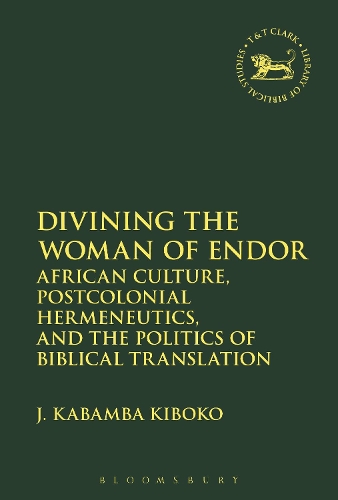
Divining the Woman of Endor: African Culture, Postcolonial Hermeneutics, and the Politics of Biblical Translation
(Hardback)
Available Formats
Publishing Details
Divining the Woman of Endor: African Culture, Postcolonial Hermeneutics, and the Politics of Biblical Translation
By (Author) J. Kabamba Kiboko
Bloomsbury Publishing PLC
T.& T.Clark Ltd
23rd February 2017
United Kingdom
Classifications
Tertiary Education
Non Fiction
Criticism and exegesis of sacred texts
220.6
Physical Properties
Hardback
288
Width 156mm, Height 234mm
617g
Description
An examination of the language of divination in the Hebrew Bible, particularly in 1 Samuel 28:3-25the oft-called Witch of Endor passage. Kiboko contends that much of the vocabulary of divination in this passage and beyond has been mistranslated in authorized English and other translations used in Africa and in scholarly writings. Kiboko argues that the woman of Endor is not a witch. The woman of Endor is, rather, a diviner, much like other ancient Near Eastern and modern African diviners. She resists an inner-biblical conquest theology and a monologic authoritarian view of divination to assist King Saul by various means, including invoking the spirit of a departed person, Samuel. Kiboko carries out a Hebrew word-study shaped by the theories of Mikhail M. Bakhtin regarding the utterance, heteroglossia, and dialogism in order to understand the designative, connotative, emotive, and associative meanings of the many divinatory terms in the Hebrew Bible. She then examines 1 Samuel 28 and a number of prior translations thereof, using the ideological framework of African-feminist-postcolonial biblical interpreters and translation theories to uncover the hidden ideology or transcript of these translations. Finally, using African contextual/cultural hermeneutics and cross-cultural translation theory, Kiboko offers new English, French, and Kisanga translations of this passage that are both faithful to the original text and more appropriate to an inculturated-liberation African Christian hermeneutic, theology, and praxis.
Reviews
Biblical scholar Jeanne Kabamba Kiboko offers a compelling case for a postcolonial reading of the biblical woman of Endor. In Divining the Woman, a subversive reading of Eurocentric conquest exegesis (230), Kiboko successfully executes her proposition to analyze, to resist, and to reconstruct the so-called canonical literature. * Reading Religion *
Author Bio
J. Kabamba Kiboko was the first clergywoman to be ordained elder (1983) in the Southern Congo Episcopal Area of the United Methodist Church. She holds a PhD from the University of Denver, USA.
